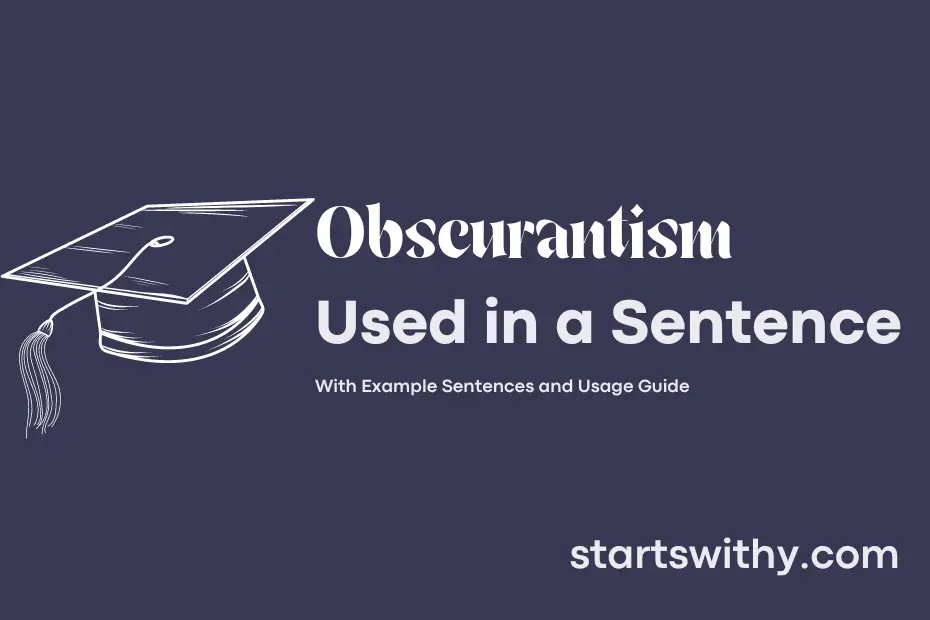Have you ever encountered a situation where information was deliberately obscured or kept from you? This act of obscuring knowledge or facts through intentional vagueness or complexity is known as obscurantism.
Obscurantism often involves the use of jargon, obfuscation, or convoluted language to hinder understanding or maintain power dynamics. It can be found in various settings, from political rhetoric to academic discourse, aiming to manipulate perception or control access to information.
7 Examples Of Obscurantism Used In a Sentence For Kids
- Obscurantism means hiding information from others.
- Some people use obscurantism to confuse others.
- It’s important to ask questions if you don’t understand obscurantism.
- Obscurantism can make things seem more complicated than they really are.
- We should always try to be clear and avoid obscurantism.
- It’s okay to ask for help if you come across obscurantism.
- Let’s work together to fight against obscurantism.
14 Sentences with Obscurantism Examples
- Obscurantism can hinder students from fully understanding complex concepts in their academic subjects.
- Many professors strive to combat obscurantism by breaking down difficult topics into simpler, more digestible parts.
- Group discussions and study groups can help combat obscurantism by promoting collaboration and shared understanding among college students.
- It’s important for students to be wary of teachers who rely on obscurantism to appear more knowledgeable than they actually are.
- Reading diverse perspectives can help students identify and challenge instances of obscurantism in their coursework.
- Obscurantism in academic writing can make it difficult for students to grasp key arguments and concepts presented in their readings.
- Analyzing primary sources can help students cut through obscurantism and gain a clearer understanding of historical events and interpretations.
- Some students may struggle with obscurantism in certain subjects and benefit from seeking additional help through tutoring services.
- Developing strong critical thinking skills can empower students to navigate through instances of obscurantism in their college coursework.
- Professors should strive to present material in a clear and accessible manner, avoiding unnecessary obscurantism that may confuse students.
- Encouraging open dialogue and asking questions can help students challenge instances of obscurantism and seek clarity in their studies.
- Collaborating with peers and sharing resources can help students combat obscurantism and deepen their understanding of complex topics.
- Students should be vigilant against obscurantism in educational materials and seek out alternative sources to broaden their perspectives.
- Seeking guidance from academic advisors can help students navigate through obscurantism in their coursework and make informed decisions about their studies.
How To Use Obscurantism in Sentences?
To use Obscurantism in a sentence, you can follow these steps:
-
Understand the meaning: Obscurantism refers to the practice of deliberately making something more complex, confusing, or difficult to understand. It is often used to obscure the truth or to prevent clear communication.
-
Identify the context: Think about a situation where information or language is intentionally made unclear or difficult to grasp. This could be in a political speech, academic writing, or any form of communication where the speaker aims to deceive or confuse the audience.
-
Construct your sentence: Start by setting up a scenario where the use of obscurantism is relevant. For example, “The politician’s speech was filled with obscurantism, making it hard for the audience to decipher his true intentions.”
-
Check your sentence: Ensure that the word Obscurantism is used correctly in the sentence to convey the idea of intentional obscurity or confusion.
-
Practice using it: Try incorporating “Obscurantism” into other sentences to become more comfortable using the term in different contexts.
Remember, the key to using Obscurantism effectively is to recognize when deliberate obfuscation or complexity is at play and to use the word in a way that accurately reflects this concept.
Conclusion
In conclusion, obscurantism in sentences can be detrimental to clear communication due to its intentional vagueness, complexity, or use of jargon to obfuscate meaning. This writing style can hinder understanding and lead to confusion or misinterpretation by the reader. By using obscurantism, writers risk alienating their audience and creating barriers to effective communication.
To ensure clarity in writing, it is essential to avoid obscurantism and strive for straightforward, concise, and transparent language. By prioritizing simplicity and clarity in sentences, writers can engage their audience more effectively and convey their message with ease. Ultimately, clarity and transparency in communication facilitate better understanding and enhance the impact of the written content.



